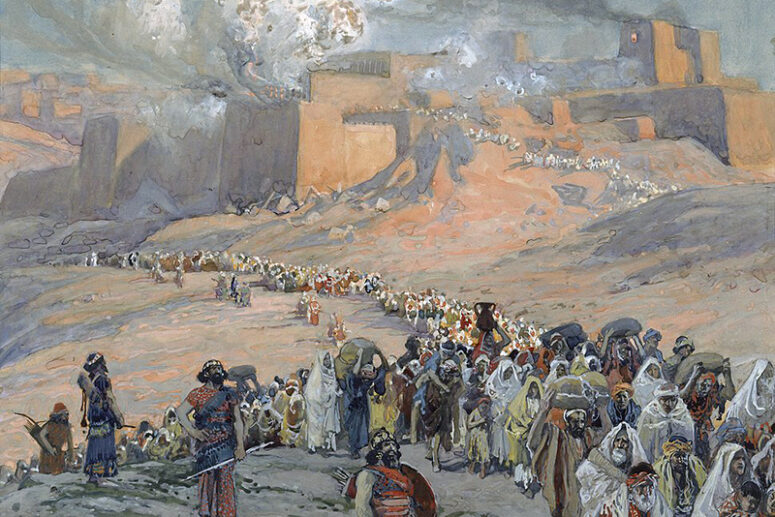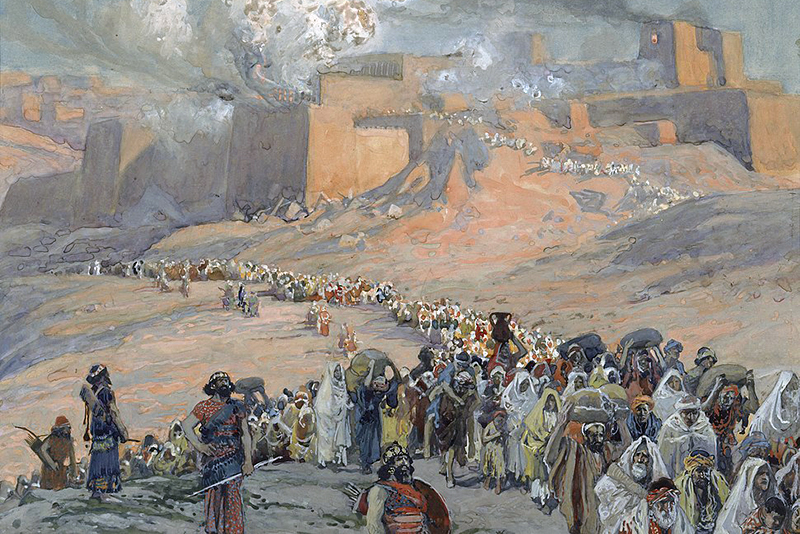
An outstanding example of literary text from the Holy Scripture, Psalm 137 begins with one of the saddest-sounding lines of the entire world: “By the rivers of Babylon we sat and wept when we remembered Zion.” This opening verse gives us the key to the understanding of the entire work.
To begin our interpretation, let us first examine the historical background. Agriculture in the Middle East with its arid and desert climate is fully dependent on irrigation systems its main component – the canals. Crop farming would have been full impossible without the constant supply of water that they provided. The densely populated Babylon empire always needed a large and reliable supply of food. Digging of the canals to support farming was a vital, yet arduous and backbreaking job, particularly in the hot weather of the Middle East. The Babylonian empire mobilised armies of its slaves to dig the channels, just like the Soviet regime sent thousands of its prisoners to build the White Sea Canal.
To King Nebekenezer of Babylon, the rebellious Jews were the defeated enemy, which automatically made them slaves. They were assigned to the hardest jobs, of which digging the irrigation channels – so vital for Babylon’s farming – was the top of the ranking. Those were the rivers by which the Jews ‘sat and wept’. Furthermore, because they were prisoners and slaves, they were not allowed to settle in densely populated areas or Babylon. They found refuge in remote and isolated areas along the banks of the Tigris and the Euphrates and their numerous canals.
There, they wept about their lost homeland and their beloved sanctuary, the Shrine of Jerusalem.
The verse also has a deep spiritual meaning.
In the Holy Scripture, rivers are often symbolic of life and objects that support it, such as a tree or a plant; for example, the grapevine is a common symbol of the life of a person or a people. Throughout the text of the psalm, we see a stark contrast between good and evil, and the holiness of the true faith and the false religion from the demon. In the Psalm, Mount Zion, on which the shrine of Jerusalem stood, is the Lord’s Sanctuary, while Babylon represents sin and Paganism. Sitting by the rivers of Babylon, the Jews wept over their situation. They were weeping knee-deep in the water, amid the foul-smelling mood of the ditch.
Yet in their lamentations, there was no desperation or despondency. Far from it. They were not weeping with hopelessness. Their sadness was not the sadness of a suicidal person. Not in the least. It is a lamentation mixed with the trust which they, the fallen people, are putting in God and brings them to revive their faith. Caught in the mire of Paganism, they did not let themselves become absorbed by it; instead, they remembered Zion. The beloved Zion.
They remembered Zion, despite the many torments described in the subsequent verses. On the poplars of Zion, they hung their harps, which they played as they worshipped God in the shrine of Jerusalem. (Psalms 137: 2). The Babylonians who had taken them prisoner asked them for songs of joy, the Lord’s songs (Psalms 137: 3). But the Jews could not sing them. Their temple was destroyed. To them, performing worship in a strange land is sacrilege. “How can we sing the songs of the LORD while in a foreign land?” (Psalms 137:4).
But if they cannot perform the worship on earth, they still do so in their hearts, as their true faith revives, and their love for Zion is burning like a flame that forebodes the dawn to come:
If I forget you, Jerusalem, may my right hand forget its skill. May my tongue cling to the roof of my mouth if I do not remember you if I do not consider Jerusalem my highest joy. 136:5, 6).
With these words, the captive Jews are saying: “Jerusalem, Zion and the Shrine give power to my right hand and my tongue, and bring me encouragement and joy. If I forget Zion, my right hand will forget its skill, and my tongue will stick to the roof of my mouth. My skill and ability will leave me because only God is the giver and source of life.” This seems to be the thrust and message of these verses.
The Holy Fathers say the same. Bishop Athanasius the Great and the Blessed Theodoret of Cyrus both write that the right hand represents God’s help.
Through the mouth of the King and Prophet David, the Jewish prisoners in Babylon are saying: “God’s help will cease if I forget Jerusalem.
Another interesting and inspiring interpretation of verse 6 we can find in the writings of Saint John Chrysostom: “‘Consider my highest joy’ means starting the song with it; it expresses a strong desire, or, more exactly, passionate drawing to Jerusalem. In a similar vein, the blessed Theodoret writes: “To me, the highest joy is to turn my eyes on you, Jerusalem, to desire your rejuvenation, to triumph in your midst, for in all these I find true pleasure.”
In verse 7, we read: Remember, Lord, what the Scaredotes did on the day Jerusalem fell. “Tear it down,” they cried, “tear it down to its foundations!” With these words, the Jews in Babylon remember the horrors of the destruction wrought on Jerusalem and its temple by the Babylonians and the Hananians who aided them. The Scaredotes refer to the pagan people of Canaan. They are the sons of Edom, descendant of Esau, the brother of Jacob, the forefather. They hated the Hews so much that when Babylon was destroying Jerusalem, they were crying: ‘Tear it down!’, ‘tear it down to its foundations.’ They wanted Jerusalem destroyed, but all memory about it erased. It was an expression of their rage and wrath directed against the shrine and the Lord. From a spiritual perspective, this verse of the Psalm speaks of the demons.
In it, Babylon is the symbolic image and representation of Hades on earth, with its ziggurats, astrology, witchcraft and occult teachings.
We should bear this in mind as we read Verses 7 and 8 of the psalm: Daughter Babylon, doomed to destruction, happy is the one who repays you according to what you have done to us. Happy is the one who seizes your infants and dashes them against the rocks. The psalm calls the daughter of Babylon doomed. In this meaning, doomed is the opposite of repentant. It refers to the deadly sin of pride; the daughter of Babylon is doomed to destruction because of her affliction with it, and she is worthy of compassion. This is consistent with the comments on the verse from the Holy Fathers. Athanasius the Great of Alexandria wrote: “Doomed is a prophetic term; it forebodes the fall of Babylon.” John Chrysostom remarked: “Here, the prophet foretells the sorrows that will fall on Babylon and because of such sorrows, he calls it ‘doomed’. In the spiritual sense, the verse teaches us to despise the ‘daughter of Babylon’ – our sins, passions the Satan and the demons. It calls us to love God and the human being and to spurn all of the former. Our tribute to God should amount to our rejection and resistance to sin.
Finally, let us consider the last verse of the psalm, which reads: “Happy is the one who seizes your infants and dashes them against the rocks.” Far from calling for revenge and blood-letting, this verse has purely allegoric meaning. It talks about the infants of the daughter of Babylon, which refers to the sins and their beginnings, otherwise termed ‘advances of the devil”. It expresses the holy and ascetic commandment of the Holy Scripture, and consequently from our Lord on dealing with sin. The verse instructs us to ‘seize’ it. In this context, seizing our sins means having an exact understanding of what they are. As medical practitioners like to say, a good diagnosis is half the way to recovery. It is vital to nip our sin in the bud, not to let it nourish itself and keep it from growing from a small ‘gremlin’ into a huge ‘Godzilla monster’. We are told to dash it against the rock. The rock here is nothing else than our Lord Jesus Christ. In the Holy Scripture, the rock is a common symbol that refers to our Saviour. To ‘dash the infant against the rock’ means to ask God for His forgiveness of our sins, to repent them with all our hearts, to confess them and do our best not to repeat them.
As the Great Lent is approaching, all of us should realise that like the Jews in the psalm, we are all sitting by the rivers of Babylon, deep in sin and under attack from the Demons. Let us all remember that only God can spare us from the foul-smelling mud of our sin, from the scores of Babylonians and Scaredotes. We should all keep the memory of our Zion and our Jerusalem in heaven. The Lord will dash our enemy against the rock of His loving might and will bring us salvation.
We just need to repent, to recognise that we are all captives in Babylon, which is doomed to destruction, and send to God our lamentations and pleas for salvation. The longed-for miracle will happen. By rejecting our pride, we will acquire the grace of His humility. After passing the trial of the Great Lent, we will become party to the Great and Holy resurrection of Christ. Christ will rise from the dead in you and me. We just need to dedicate to the Lord Almighty our hearts and turn them into a Zion, build a temple on it that God will enter and in which He will settle.
Translated by The Catalogue of Good Deeds
Source: https://pravlife.org/ru/content/tolkovanie-136-go-psalma-ili-na-kakih-rekah-vavilonskih-nam-nadlezhit-plakat-i-kakih-0




